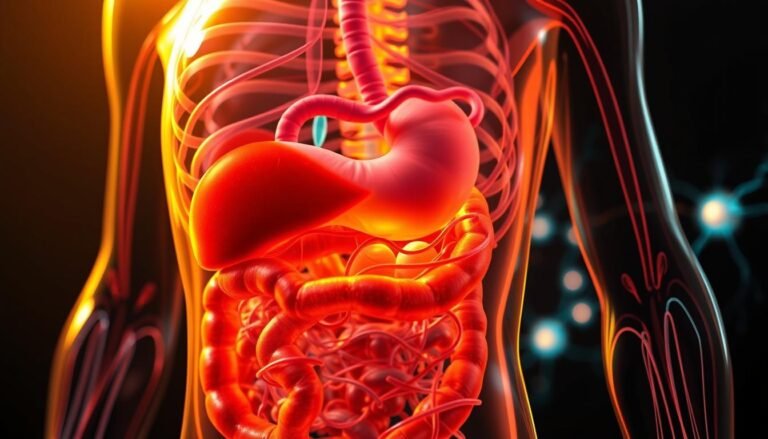Ever wondered why your body burns calories slower as you age? You’re not alone. Many people find their energy conversion process slows, leading to weight gain and fatigue.
Your body’s energy conversion process is influenced by genetics, age, and lifestyle. As you age, your energy conversion rate naturally slows. But, there are ways to fight this decline and keep your rate healthy.
Understanding how your body works is key to controlling your energy levels and well-being. In this article, we’ll look at what affects your energy conversion. We’ll also share tips on how to keep it running smoothly.
Understanding What Metabolism Really Is
Metabolism is how your body turns food into energy. It’s key to keeping you alive. It helps your body do everything from basic cell work to big physical tasks.
The Science Behind Your Body’s Energy Production
Your body makes energy through metabolic processes. Metabolism breaks down food into energy for your body’s needs. This keeps your body balanced, helps it grow, and fixes itself.
Basal Metabolic Rate (BMR) Explained
Basal Metabolic Rate (BMR) is how many calories your body needs to rest. It depends on muscle, size, and body type. Knowing your BMR is important because it’s most of your daily calorie use.
The Difference Between Metabolism and Digestive System
Metabolism and the digestive system are different, though related. The digestive system breaks down food into nutrients. Metabolism is how your body uses those nutrients for energy and other important tasks.
Knowing the difference helps you understand how to keep your metabolism healthy. This is through what you eat and how you live.
Why Your Metabolism Naturally Slows Down With Age
Your metabolic rate changes as you get older. It slows down due to biological changes that happen over time.
The Biological Timeline of Metabolic Changes
Your body’s metabolism shifts as you age. It peaks in early adulthood and then starts to decline. This decline can begin in your 30s, with bigger changes after 40.
Hormonal Shifts That Impact Metabolic Rate
Hormonal changes are key in the decline of metabolic rate with age. Hormones like testosterone and growth hormone decrease, affecting how you metabolize.
Muscle Loss and Its Effect on Calorie Burning
Muscle loss, or sarcopenia, is a big factor. Losing muscle means your body burns fewer calories at rest.
Sarcopenia and Age-Related Muscle Decline
Sarcopenia starts as early as 30. It causes a gradual loss of muscle and strength.
How Muscle Mass Affects Daily Energy Expenditure
Muscle tissue burns calories even when you’re not active. The more muscle you have, the higher your resting metabolic rate (RMR) is.
- Muscle mass is a big part of your basal metabolic rate.
- Less muscle means a lower metabolic rate.
- Resistance training can help keep muscle loss at bay.
Key Factors That Affect Your Metabolic Rate
Many things can change your metabolic rate. These include your genes, body type, and the world around you. Knowing about these can help you make choices to boost your metabolism.
Genetic Predispositions
Your genes greatly influence your metabolic rate. Some people naturally have a faster or slower metabolism. You can’t change your genes, but knowing their role helps you find ways to improve your metabolism.
Body Composition and Size
Your body’s makeup, like muscle to fat ratio, affects your metabolic rate. More muscle means a higher metabolic rate. This is because muscle burns more energy than fat.
Key factors influencing metabolic rate due to body composition:
- Muscle mass percentage
- Body size and surface area
- Ratio of lean body mass to body fat
Gender Differences in Metabolism
Gender also plays a part in metabolic rate. Men usually have a higher rate than women. This is mainly because of body differences and hormone levels.
Environmental Factors
Things around you can also change your metabolic rate. Two big factors are temperature and climate, and altitude and oxygen levels.
Temperature and Climate Effects
Your body works harder in extreme weather. This can make your metabolic rate go up. For example, living in a cold place makes your body work harder to stay warm.
Altitude and Oxygen Availability
At high altitudes, there’s less oxygen. This can make your body work harder at first, increasing your metabolic rate. But over time, your body might adapt.
| Factor | Impact on Metabolic Rate |
|---|---|
| Genetics | Influences natural metabolic rate |
| Muscle Mass | Increases metabolic rate |
| Gender | Men generally have higher metabolic rates than women |
| Climate/Temperature | Extreme temperatures can increase metabolic rate |
| Altitude | Can affect metabolic rate due to changes in oxygen availability |
Recognizing the Signs of a Slowing Metabolism
A decrease in metabolic rate can show up in many ways. It’s important to know the signs. As your metabolism slows, you might notice changes in your weight, energy, and health.
Weight Gain Despite Consistent Diet
One common sign is unexplained weight gain, even with the same diet. This happens because your body burns fewer calories, leading to weight gain.
Constant Fatigue and Energy Fluctuations
Feeling tired or having energy ups and downs is a sign of a slower metabolism. A slower metabolism means your body can’t turn food into energy as well.

Temperature Sensitivity and Cold Extremities
Some people with a slowing metabolism feel colder than usual. They might also have cold hands or feet. This is because a slower metabolism affects how well your body keeps warm.
Digestive Changes and Issues
Changes in digestion, like constipation or bloating, can also be a sign. As your metabolic rate goes down, your digestive system works less efficiently.
Knowing these signs can help you take action. You can work to keep your metabolism healthy and maintain a good weight and overall well-being.
How Your Diet Impacts Metabolism and Weight Loss
Knowing how your diet affects your metabolism is crucial for losing weight. The food you eat greatly influences your metabolic rate. Some foods can help boost your metabolism, while others can slow it down.
The Thermic Effect of Food Explained
The thermic effect of food (TEF) is the energy your body uses to digest nutrients. Foods have different TEF values. Protein has a high TEF, meaning it makes your body work harder to digest it.
Protein’s Role in Metabolic Function
Protein is key for a diet that boosts metabolism. It has a high TEF and helps build and keep muscle. Eating protein-rich foods like lean meats, fish, and legumes can increase your metabolic rate.
How Calorie Restriction Can Backfire
Reducing calories can lead to weight loss at first. But cutting calories too much can harm your metabolism. Your body might go into “starvation mode,” lowering your metabolic rate to save energy.
Metabolic Adaptation to Dieting
When you eat fewer calories, your body adjusts by spending less energy. This makes it harder to lose weight over time.
The Importance of Caloric Cycling
Caloric cycling means switching between different calorie levels. It keeps your metabolism active. This method helps avoid metabolic slowdown and supports weight loss.
Meal Timing and Frequency Debates
The debate on when and how often to eat is ongoing. Some say eating small meals often boosts metabolism. Others believe intermittent fasting is better. The best approach is finding a meal pattern that supports your metabolic health.
| Dietary Component | Effect on Metabolism | Examples |
|---|---|---|
| Protein | Increases metabolic rate due to high TEF | Lean meats, fish, legumes |
| Calorie Restriction | Can lead to metabolic adaptation | Very low-calorie diets |
| Caloric Cycling | Helps prevent metabolic adaptation | Alternating calorie intake |
Metabolism-Boosting Foods and Eating Strategies
Certain foods and eating strategies can boost your metabolic rate. By adding the right foods and practices to your daily routine, you can increase your metabolism. This supports your overall health.
Protein-Rich Foods That Increase Calorie Burn
Protein-rich foods need more energy to digest than carbs and fats. This means they can help burn more calories. Good examples include lean meats like chicken and turkey, fish like salmon, and plant-based options like lentils and chickpeas.
Eating protein with every meal can keep your metabolism high all day.
Spices and Ingredients With Thermogenic Properties
Some spices and ingredients can make your body generate heat. This can boost your metabolism. Chili peppers, ginger, and turmeric are good examples. Adding these to your meals can add flavor and a metabolic boost.

Strategic Carbohydrate Consumption
The type and timing of carbs can affect your metabolic rate. Complex carbs, like whole grains, are digested slowly. This gives you sustained energy. Adjusting your carb intake based on your activity can also optimize your metabolism.
Hydration’s Surprising Effect on Metabolic Rate
Drinking enough water is key for a healthy metabolism. Even a little dehydration can slow it down. Drinking water all day supports your metabolic function and health.
Drink at least eight glasses of water a day. More if you’re active.
Exercise Approaches to Revitalize Your Metabolism
To boost your metabolism, it’s key to add effective exercises to your daily routine. Regular activity burns calories and builds muscle. This increases your metabolic rate.
Strength Training: The Metabolic Game-Changer
Strength training is a great way to boost your metabolism. It builds muscle, which raises your resting metabolic rate (RMR). This means you burn more calories even when you’re not moving. Focus on compound movements like squats, deadlifts, and bench presses for the best results.
Compound Movements for Maximum Effect
Compound exercises work many muscles at once. They’re excellent for building strength and muscle. Some examples are:
- Squats
- Deadlifts
- Bench Press
- Pull-ups
Resistance Training Frequency Recommendations
For the best results, do resistance training 2-3 times a week. Make sure to target all major muscle groups.
High-Intensity Interval Training (HIIT) Benefits
HIIT involves short, intense workouts followed by brief rests. It boosts metabolism and improves heart health.
The Role of Steady-State Cardio
Steady-state cardio, like jogging or cycling, burns calories during exercise. It may not boost RMR as much as HIIT or strength training. But it’s still important for fitness.
Creating an Exercise Plan for Maximum Metabolic Impact
To get the most metabolic benefits, mix strength training, HIIT, and steady-state cardio. Make sure to listen to your body and rest enough.
By adding these exercises to your life, you can revitalize your metabolism and enhance your health.
Understanding Fast and Slow Metabolism: Facts and Misconceptions
Metabolic rate varies from person to person. It’s influenced by genetics, environment, and lifestyle. This variation leads to people being classified as having a “fast” or “slow” metabolism.
What Science Says About Metabolic Variation
Studies show that metabolic rate changes a lot among people. Factors like genetics, body composition, and age play a big role. Genetic predispositions are key in determining metabolic rate. For example, some people might inherit a faster or slower metabolism from their parents.
The Reality of “Fast Metabolism” Individuals
Those with a fast metabolism burn calories more quickly. This makes it harder for them to gain weight. But, it doesn’t mean they’re safe from the effects of overeating or a sedentary lifestyle.
Addressing “Slow Metabolism” Concerns
People with a slow metabolism might find it easier to gain weight. This is because they burn calories at a lower rate. It’s important to know that a slow metabolism can be caused by muscle loss, hormonal imbalances, and certain medical conditions.
How to Accurately Assess Your Metabolic Rate
To find out your metabolic rate, consider these factors:
- Genetic predispositions
- Body composition (muscle-to-fat ratio)
- Age and hormonal changes
- Lifestyle factors (diet, exercise, sleep)
Knowing your metabolic rate helps you create a diet and exercise plan that fits you. This can improve your metabolic health.
Lifestyle Habits That Secretly Slow Your Metabolism
Your daily habits can greatly affect your metabolic rate. You might not even notice it. Making small changes to your routine can help your body burn calories better.
Sleep Deprivation’s Metabolic Consequences
Lack of sleep can really slow down your metabolism. When you don’t sleep enough, your body can’t control hunger hormones well.
How Poor Sleep Affects Hunger Hormones
Poor sleep makes you hungrier. It increases ghrelin, the hunger hormone, and lowers leptin, the fullness hormone. This can lead to eating too much and gaining weight.
Optimal Sleep Duration for Metabolic Health
Adults need 7-9 hours of sleep each night for good metabolic health. Getting enough sleep is key to keeping a healthy weight and supporting your metabolism.
How Stress Hormones Affect Energy Expenditure
Chronic stress hurts your metabolism. Stress makes your body release cortisol, a hormone that stores fat, especially around your belly.
Sedentary Behavior Throughout the Day
Being too still can slow your metabolism. Moving regularly keeps your metabolic rate up.
Alcohol and Metabolism: The Relationship
Drinking too much alcohol can harm your metabolism. It makes it harder for your body to burn fat, leading to weight gain.
| Lifestyle Habit | Impact on Metabolism |
|---|---|
| Sleep Deprivation | Disrupts hunger hormones, leading to overeating |
| Chronic Stress | Increases cortisol, leading to fat storage |
| Sedentary Behavior | Slows down metabolic rate |
| Excessive Alcohol Consumption | Interferes with fat burning, leading to weight gain |
Medical Conditions That May Be Affecting Your Metabolism
Many medical conditions can slow down your metabolism without you noticing. It’s important to know about these conditions to improve your metabolic health.
Thyroid Disorders and Metabolic Function
The thyroid gland is key in controlling metabolism. Thyroid disorders, like hypothyroidism and hyperthyroidism, can change your metabolic rate. Hypothyroidism, for example, can make your metabolism slower, causing weight gain and tiredness.
Insulin Resistance and Metabolic Syndrome
Insulin resistance is a sign of type 2 diabetes. It happens when your body’s cells don’t respond well to insulin. This can slow down your metabolism and cause weight gain, especially around the belly.
Metabolic syndrome is a group of conditions like high blood pressure and high blood sugar. It’s often linked to insulin resistance.
When to Consult a Healthcare Provider
If you’re gaining weight without trying, feeling tired, or cold all the time, see a doctor. They can check if a medical issue is slowing down your metabolism.
Medical Tests That Assess Metabolic Health
There are tests to check your metabolic health. These include thyroid function tests, fasting glucose tests, and lipid profiles. These tests can spot conditions like thyroid problems and insulin resistance. This lets doctors treat you to boost your metabolism.
Conclusion: Creating Your Personalized Metabolism-Boosting Plan
Understanding what affects your metabolism is the first step to a healthier you. Boosting your metabolic rate requires diet changes, regular exercise, and lifestyle tweaks. Start by eating a balanced diet full of protein to boost your resting metabolic rate.
Adding strength training and high-intensity interval training (HIIT) to your routine can also help. These activities significantly increase your metabolism.
Don’t forget the importance of lifestyle habits like getting enough sleep, managing stress, and staying hydrated. Making these changes and staying consistent can help you create a plan that boosts your metabolism and improves your overall health. Take charge of your metabolic health today and discover how to boost your metabolism for a more vibrant life.


